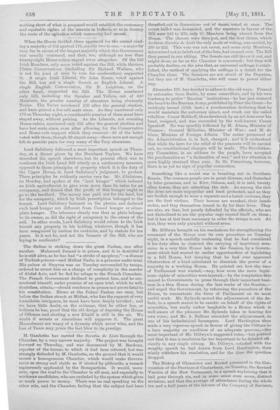Lord Salisbury delivered a most important speech on Thurs- day,
at a dinner given by the Merchant Taylors. We have described the speech elsewhere, but its general effect was to condemn the Irish Laud Bill utterly as a confiscatory measure, opposed to those principles of property which it is the duty of the Upper House, in Lord Salisbury's judgment, to protect. These principles he evidently carries very far. Mr. Gladstone, on Monday, had spoken of the "laud hunger" which induced an Irish agriculturist to give even more than its value for an occupancy, and denied that the profit of this hunger ought to go to the landlord, The money was paid not for the land, but for the occupancy, which by Irish prescription belonged to the tenant. Lord Salisbury fastened on the phrase, and declared such land hunger not different from Consol hunger or silver- plate hunger. The inference clearly was that as plate belongs to its owner, so did the right of occupancy to the owner of the soil. In other words, Lord Salisbury would refuse to the Irish tenant any property in his holding whatever, though it has been recognised by custom for centuries, and by statute for ten years. Is it not he, and not the framers of the Bill, who are trying to confiscate P


































 Previous page
Previous page